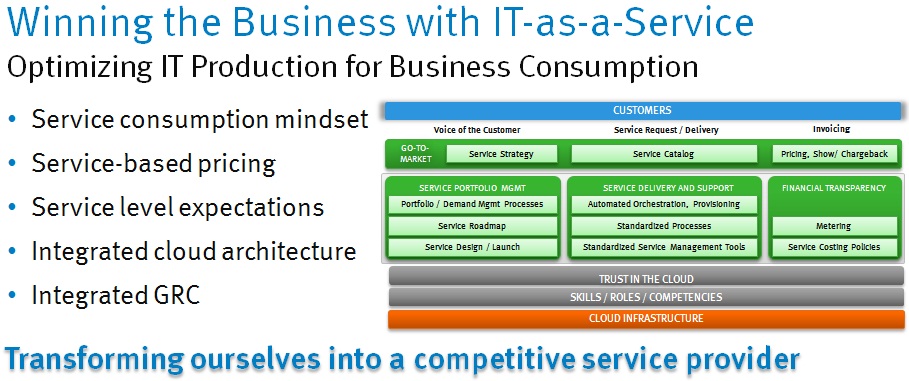Changing IT from a traditional corporate IT organization to a professional service provider offering IT as a Service is a bit like making the ideological leap from communism to capitalism. The transformation encompasses everything from the changing IT processes and technologies to getting people to think and behave differently as they begin to deliver services instead of technology piece-parts.
Not only that, but this seismic shift has to be accomplished quickly with limited resources because every day we delay this transformation, more and more of our business clients turn to other sources to get their IT needs met, whether it’s public cloud service providers or standing up applications on servers underneath their desks.
While the work is not taking place in someone’s garage, here at EMC IT our ITaaS launch has all the markings of a start-up business venture—which is just the mindset I’ve encouraged my team to adopt as we move forward. Think like an entrepreneur. Act like a startup.
Many startups are resource and funding challenged. They have no revenue; are trying to do it all on a shoestring budget; and need to get to market as soon as they can with a product they truly believe in… a product they know customers will find valuable and want more of.
Startups must also strike a balance between time-to-market and feature-functionality. It’s vital that we get to market fast, and that the services we’re offering be solid enough to earn repeat business. This is a delicate balance and one that must be top-of-mind on our ITaaS journey.

We, in EMC IT, are used to pursuing (though never achieving) perfection. It is part of our culture, engrained in our DNA. But, we can get so caught up in getting every detail perfect that we lose the timeliness of what we are developing. We have a tendency to feel guilty about imperfection.
With ITaaS, we are taking a more entrepreneurial tack. We want our product good enough to please our internal clients right away, but strong enough to be sustainable and bring in repeat “sales”. But we’d better not attempt to make our debut ITaaS products perfect or we’ll never make it to market.
Like any good startup, we will gain feedback and insight into customer needs while we’re serving them and be agile enough to respond frequently and quickly with improvements. It’s an evolution, so we can always adjust our service catalog offerings after the ITaaS launch to incorporate what we learn.
To drive this point home with our team, I’ve often asked “What would you do differently if you got a commission on every unit of IT that we deliver in this new model?” Interestingly, the answers to this question are usually quickly offered, and quite different from what’s being done today….an indication that the start-up mentality has not yet taken hold as completely as it needs to.
The differences between how IT has traditionally run and how it needs to run in an ITaaS model are as stark as the differences between monopolistic agencies and private business ventures.
Until now, EMC IT has functioned much like a monopolistic agency. We have a fixed annual budget and a certain number of people, “behind the counter”. We do the best we can, with the resources we have, and apologize for the wait. We are reluctant to give commitments around service levels and we avoid doing anything that might actually create demand that we can’t fulfill.

ITaaS introduces an entirely different paradigm, much like a private business venture would employ; a customer-demand-driven model that is funded through service consumption. Rather than apologizing to those people in line, we need to compete for and win their business. To do that, we will have to establish and exploit competitive advantages. We need to exercise and hone our entrepreneurial skills—being cost competitive, meeting customer demands, actively promoting our offerings, gaining market share, and creating new market opportunities.
The good news is that being an entrepreneur in start-up mode is exciting, creative, fast-paced and challenging. The more we spread our entrepreneurial wings, the more we become an organization that is comfortable with competing for business. And just like the entrepreneurial spirit we are tapping into, we will be a nimble, more relevant force in our market and we can leave the apologizing to the monopolistic agencies.